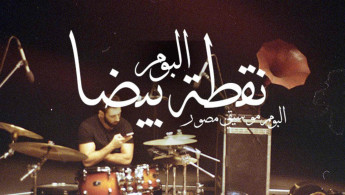Same hypocrisy, same corruption: Cairokee's banned album tells a truth young Egyptians can connect with
The album No'ta Beida (The White Point) was not allowed to be sold in physical form – a first for the band – so they opted for an online release instead.
Two weeks later and their first single charted number one on Egyptian YouTube, overtaking Egypt's favourite Amr Diab by several million views.
It was inevitable. The album told a truth in a way that young people could connect with.
Cairokee lead singer, Ameer Eid, whose tattoo reads: "You die standing up or you live on your knees," confronted these 'controversial' issues in an interview with Misr 24.
"It's clear that there are some who want to ignore the problems of young people," he said.
"We're going to continue like nothing happened and our songs will always be free."
The group is accustomed to censorship. Their songs have been banned from the radio and TV for years. At a first listen of No'ta Beida, one may let out gasps followed by 'oh wow, did he really just say that?
On the album's eighth track Dinosaur, Eid sings of Tiran and Sanafir, the two islands handed over to Saudi Arabia despite national disgust.
"They gave to them what was ours, after they sold our lands, speaking on behalf of us – a people who were not involved," lyrics say.
Translations can rarely project the raw power, spun from the tongue of someone who is truly angry, but this passion can be heard on almost every song and is truly an act of resistance.
 |
Surfing channels to kill time and the boredom, The same hypocrisy, same corruption, same stupidity and mindlessness, That stops us from eating bread. - Dinosaur |
 |
However, the band has routinely denied that the album is revolutionary, instead suggesting it just represents the views of the modern youth.
"The [songs] express the feelings of the young people and their disappointment with how the January 25 Revolution and their revolution against the Muslim Brotherhood ended," band spokesperson Ahmed Medhat told al-Monitor.
The track Hudna (Ceasefire) confronts this issue head on.
 |
It's time for me to fight so I can live in peace, I tried to give up and I tried to stay in denial, but all the paths lead me to a confrontation - Hudna |
 |
But don't take the band the wrong way – this is not a call for a repeat of 2011.
"No, it's not about defiance," Eid said.
"It's about preserving our ideas and freedom of expression – this is the least of our rights. I don't think that taking your rights is a confrontation," he adds.
Follow Cairokee on Facebook



